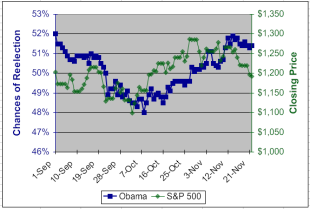Obama No Longer Election Underdog, New Polls Suggest
It’s the Stock Market, Stupid? Why Obama is No Longer the Underdog
November 23, 2011
The Signal - Pretty much since the day he was elected president of the United States in November 2008, Barack Obama has been the favorite on prediction markets like Intrade and Betfair to win re-election for a second term, as most incumbents do. That changed in September and October, when the budget stalemate and grim economic news turned Obama, for the first time, into an underdog.
But after bottoming out on October 8, when the prediction markets gave him a 48 percent chance of winning re-election, Obama has slowly and steadily climbed back to his August levels. His current odds, computed as an average of Intrade and Betfair, give him a 51.4 percent chance to win.
Obama's poll results and approval ratings are ticking up now, too. While it's tempting to credit scandals (exhibit C and G) or infighting among Obama's potential Republican rivals, or Republican stubbornness in the ongoing deficit reduction debate, the simplest explanation harkens back to the signature phrase of Bill Clinton's first presidential campaign, "It's the economy, stupid."
Brighter economic news and the prospect of a decent holiday season have handicappers wagering that economic conditions, or at least momentum, will be sufficient next fall that many voters will consider themselves better off in 2012 than 2008, and pull the lever for Obama.
The stock market is itself a massive prediction market forecasting the future profits of American businesses. As such, the Standard and Poor's 500 index offers about as good a guide as any to the economic outlook ahead. In the last 90 days, the S&P 500 has tracked a remarkably similar course as Obama: declining in September, bottoming out on October 3, rising steadily through October until November before beginning a slight decline again on November 14.
In the figure, I've graphed Obama's likelihood to win on the prediction markets and the S&P 500 index price on the same chart. Although there can be a danger of reading too much into suggestive graphs (I don't advocate chartism), it's hard to imagine the correspondence is purely coincidental.




No comments:
Post a Comment